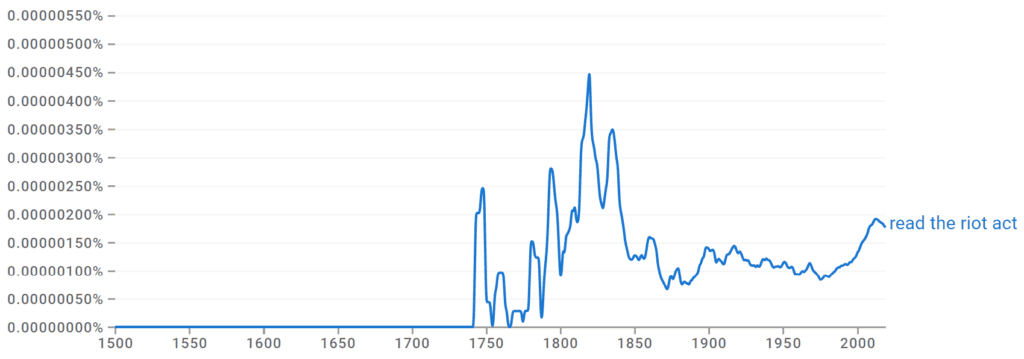Read the riot act means to scold or reprimand someone so severely, ensuring that certain behaviors or actions never repeat. It’s threatening to ground your kid for a month for something minor, so they know never to even try and do it.
But it’s more than just an old British law; it’s evolved into a vivid expression we use today. Idioms, like read the riot act, are phrases that don’t have a literal meaning, elevating our conversations with historical and cultural richness.
So, as we dig into this phrase with its true meaning and origin story, you’ll also learn how to use it in a sentence with the examples I provide. Let’s get to it!
The Meaning of Read the Riot Act

To read the riot act is an idiom that means to deliver a stern warning or reprimand to someone, emphasizing that their unacceptable behavior must cease or face serious consequences. This phrase carries historical weight, originating from a real act and reflecting societal mechanisms of control.
Drawing a parallel to modern times: if you’ve ever been caught doing something you shouldn’t, like sneaking a midnight snack or staying out past curfew, and someone, perhaps a parent or guardian, lays down the law with stern, unwavering words, they are essentially “reading you the riot act.” This idiom serves as a poignant reminder that even the most mundane moments of admonishment have roots that echo back through the corridors of history.
Different Tenses to Use
- Read (Past Tense): The principal called Jake into his office and read him the riot act after he was caught skipping classes.
- Read (Present Tense): Whenever she’s upset with her colleagues, she wants to read them the riot act.
- Will Read (Future Tense): If this mess isn’t cleaned up by tomorrow, I will read them the riot act.
- Reads (Present Tense, Third Person Singular): Whenever she catches her brother sneaking cookies from the jar, she reads him the riot act.
- Reading (Present Continuous Tense): I can’t come to the phone right now; I’m reading my son the riot act for drawing on the walls.
- Has/Have Read (Present Perfect Tense): She’s never been late to a meeting because she has read the riot act to herself about punctuality.
- Had Read (Past Perfect Tense): By the time the team meeting started, the manager had already read the riot act to a few members about their recent performance.
Read the Riot Act Origin and Etymology

The phrase “read the riot act” has a foundation firmly cemented in historical events. In 1714, amid a backdrop of civil unrest and societal tension, the British Parliament passed the Riot Act. This legislation empowered authorities to declare any assembly of twelve or more people as potentially rebellious and unlawful—a stringent measure reflecting the concerns of the times.
To enforce this act, authorities had to first formally notify the gathered crowd of its transgression. This was done by reading aloud a specific part of the act, which began with the commanding words, “Our Sovereign Lord the King chargeth and commandeth…” This reading was more than just a ceremony; it was a dire warning. If, after an hour from this proclamation, the assembly persisted, officials were authorized to take more severe actions, which could range from arrests to the employment of force.
Over time, the gravity and formality associated with this act seeped into colloquial language. The phrase transitioned from its original, literal context to the metaphorical act of sternly warning someone. Today, while the Riot Act itself may be a historical footnote for many, its linguistic legacy persists, reminding us of the power of words and the evolution of language rooted in societal dynamics.
What Is a Synonym for Read the Riot Act?
- Give a dressing down
- Chew out
- Scold
- Give a piece of one’s mind
- Rebuke
- Berate
- Rake over the coals
How Do You Use ‘Read the Riot Act’ in a Sentence?

This phrase is tricky to master, so here are a few examples of how you can work it into a sentence.
- When Tim missed his curfew, his parents read him the riot act and made sure he’d never miss it again.
- The basketball coach read the riot act to the team after their third consecutive loss.
- “If you walk through that door past midnight again, I’ll read you the riot act!” warned his mother.
- The science teacher read the riot act to our class after some silly prank went way too far.
- You better believe I’ll read the riot act to anyone caught littering in the park across from my house.
- After the embarrassing mishap at the conference, the boss read everyone the riot act.
- When my two kids painted their grandmother’s dog blue, she read them the riot act.
- “I’ve told you about leaving your toys everywhere. Consider this me reading you the riot act,” said the exasperated father.
You’ve Been Warned
Read the riot act is a phrase that showcases the evolution of language, from stern British officials to modern-day rebukes. This isn’t a phrase easily slipped into a conversation, though, so have fun playing with it! Grab a few more idioms for your verbal arsenal straight from our site!

Comments are closed.